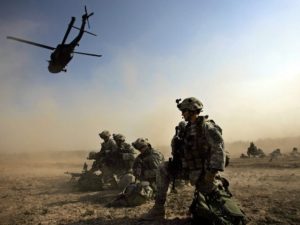by WorldTribune Staff, November 8, 2016
U.S. forces are engaged on multiple fronts against an enemy that has no problem putting civilians in harm’s way. And there is no end in sight for this long-term mission against jihadists determined to carry out mass attacks long after they are driven from their Iraqi and Syrian strongholds.
That is just a part of the foreign policy inheritance U.S. President Barack Obama will leave his successor on Jan. 20, 2017.

U.S. commanders say the defeat of Islamic State of Iraq and Levant (ISIL) in Mosul and Raqqa is inevitable. But the broader fight against the terror organization is far from over.
Analysts say Obama’s successor will be told additional U.S. troops are needed on the ground as part of a long-term commitment of American forces.
“This is going to be a preoccupation of whoever wins the U.S. election,” said David Ucko, who teaches at the National Defense University in Washington, D.C.
The next president will also likely have to deal with ISIL in Libya. Despite earlier reports that it had stopped bombing in Sirte, the U.S. on Nov. 7 renewed authorization to continue airstrikes after a three-month blitz failed to propel Government of National Accord (GNA) forces to victory.
The Pentagon briefly contemplated suspending the campaign in Libya on Oct. 31, but GNA ground forces continued struggling to push ISIL out of their final bastions in the coastal town.
The U.S. Navy said its is using AH-1W Super Cobra helicopters flying off the amphibious transport dock ship USS San Antonio for airstrikes in Sirte.
“We are prepared to continue support, including airstrikes for the GNA,” Pentagon spokesman Peter Cook said. “There is still a fight going on in this one particular neighborhood. There’s a small group of ISIL fighters who remain.”
ISIL’s ideology has spread far beyond Iraq and Syria. The terror group is also active in Afghanistan and in pockets of Europe, North Africa and Southeast Asia.
“Defeating ISIL doesn’t bring an end to the problem,” said Anthony Cordesman, a former Pentagon official who is now a defense expert with the Center for Strategic and Budgetary Assessments.
“We can destroy extremist elements as a proto state. And that is very important,” he said. “But this is not something that is going to have a quick, easy end. One way or other the foreign fighters who affiliated themselves with ISIS are still going to be around in significant numbers.”
Ted Karasik, a Middle East expert with Gulf State Analytics, said the next president will confront questions about a long-term U.S. presence similar to the one Obama faced in 2011, when all operational forces were withdrawn.
“It’s easy to come up with the argument, once the U.S. feels comfortable that the Iraqis have the situation under control, that the U.S. can slowly wind down and leave. Then, of course, we’ll be back where we were 2012,” Karasik said in a recent interview.
“We don’t want history to repeat itself, so the next administration will have to deal with that question.”
